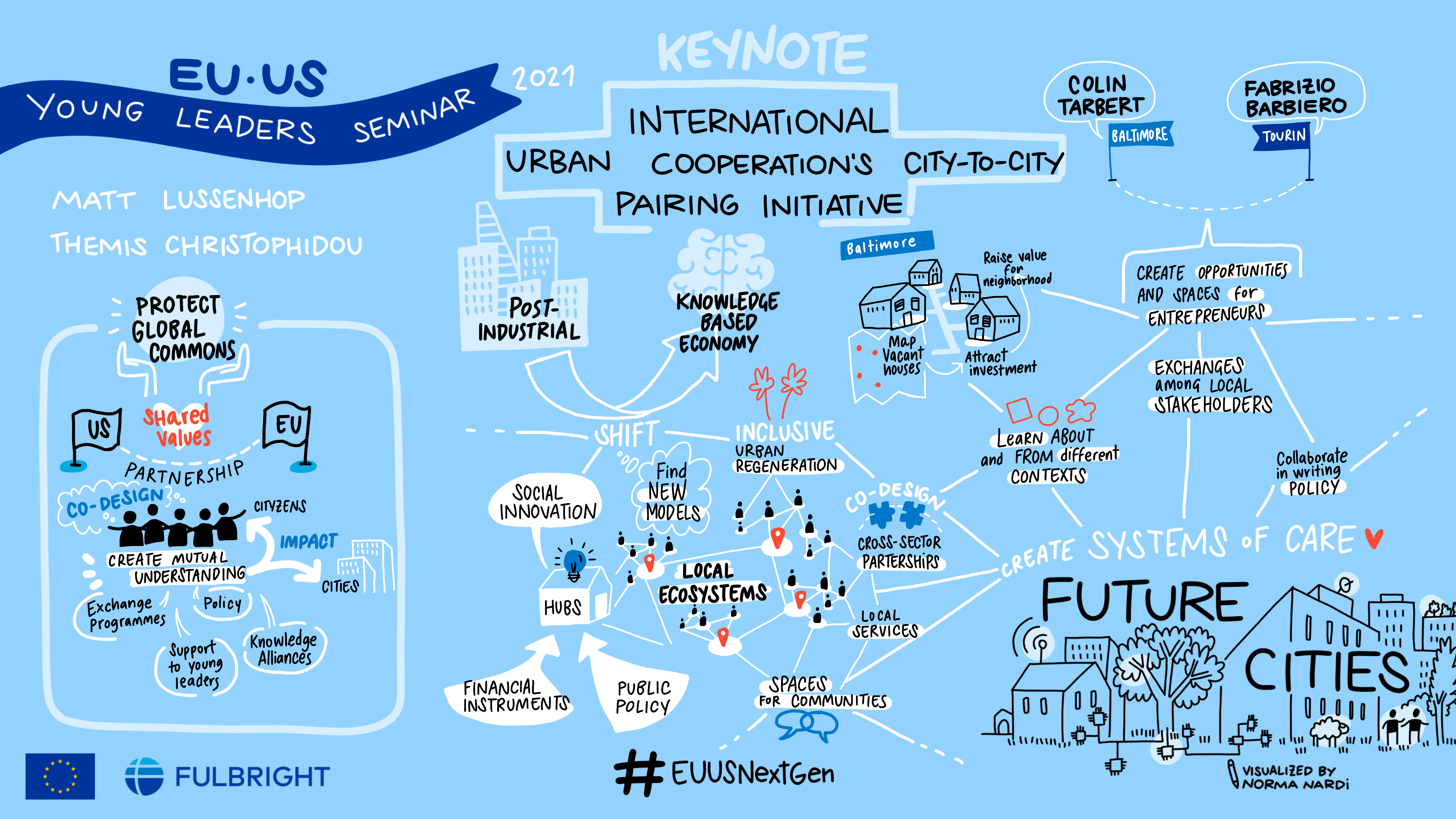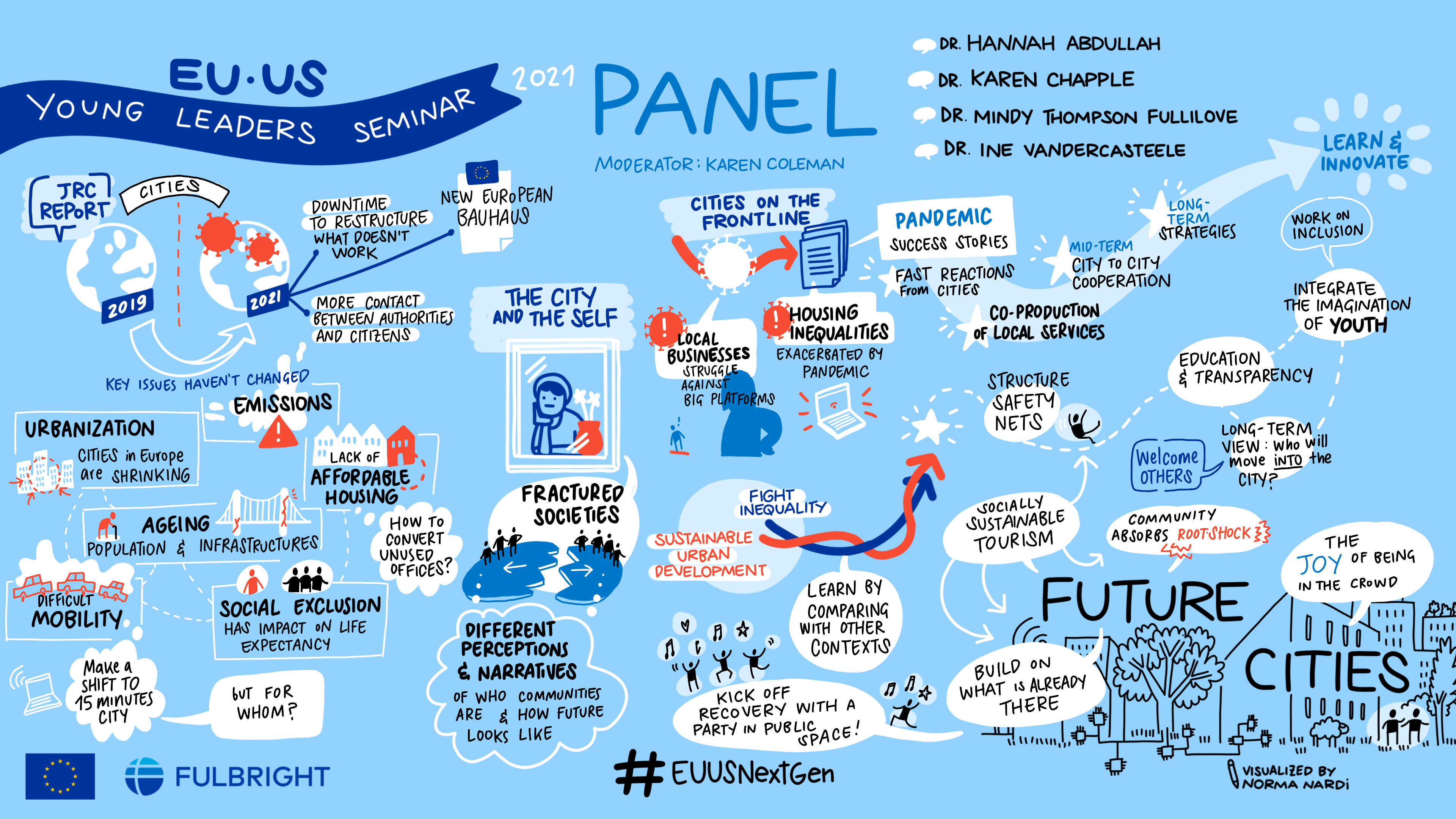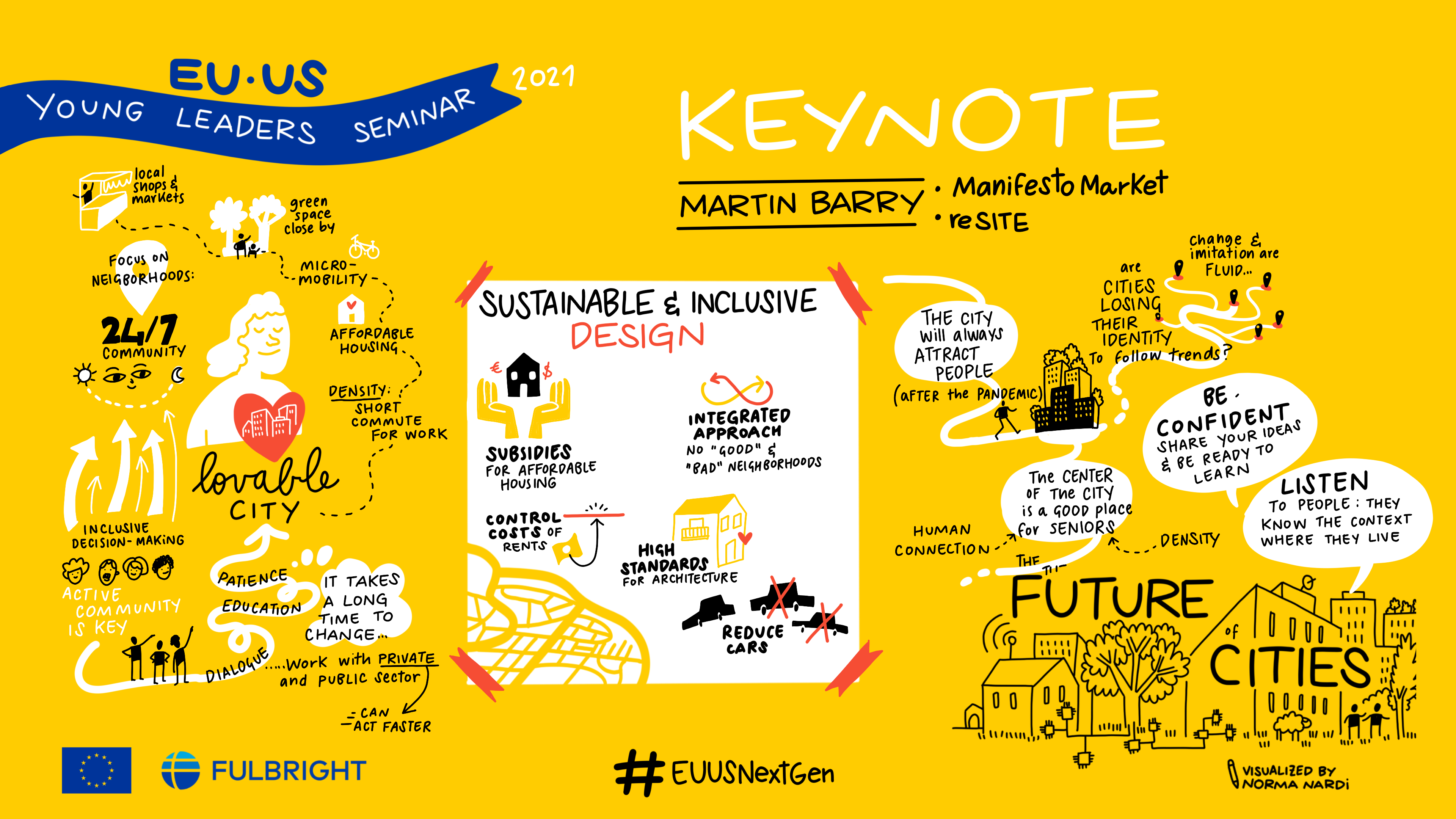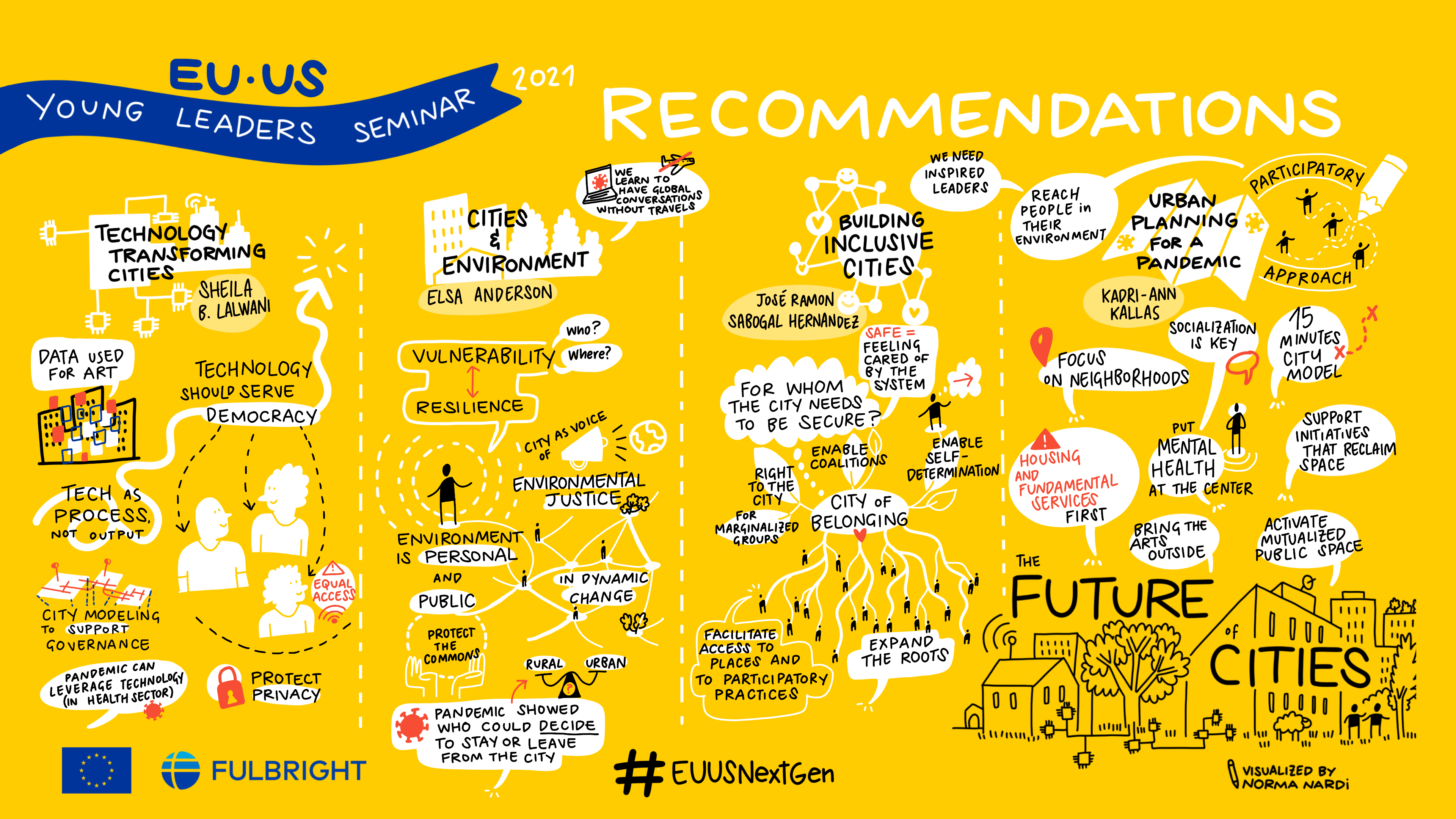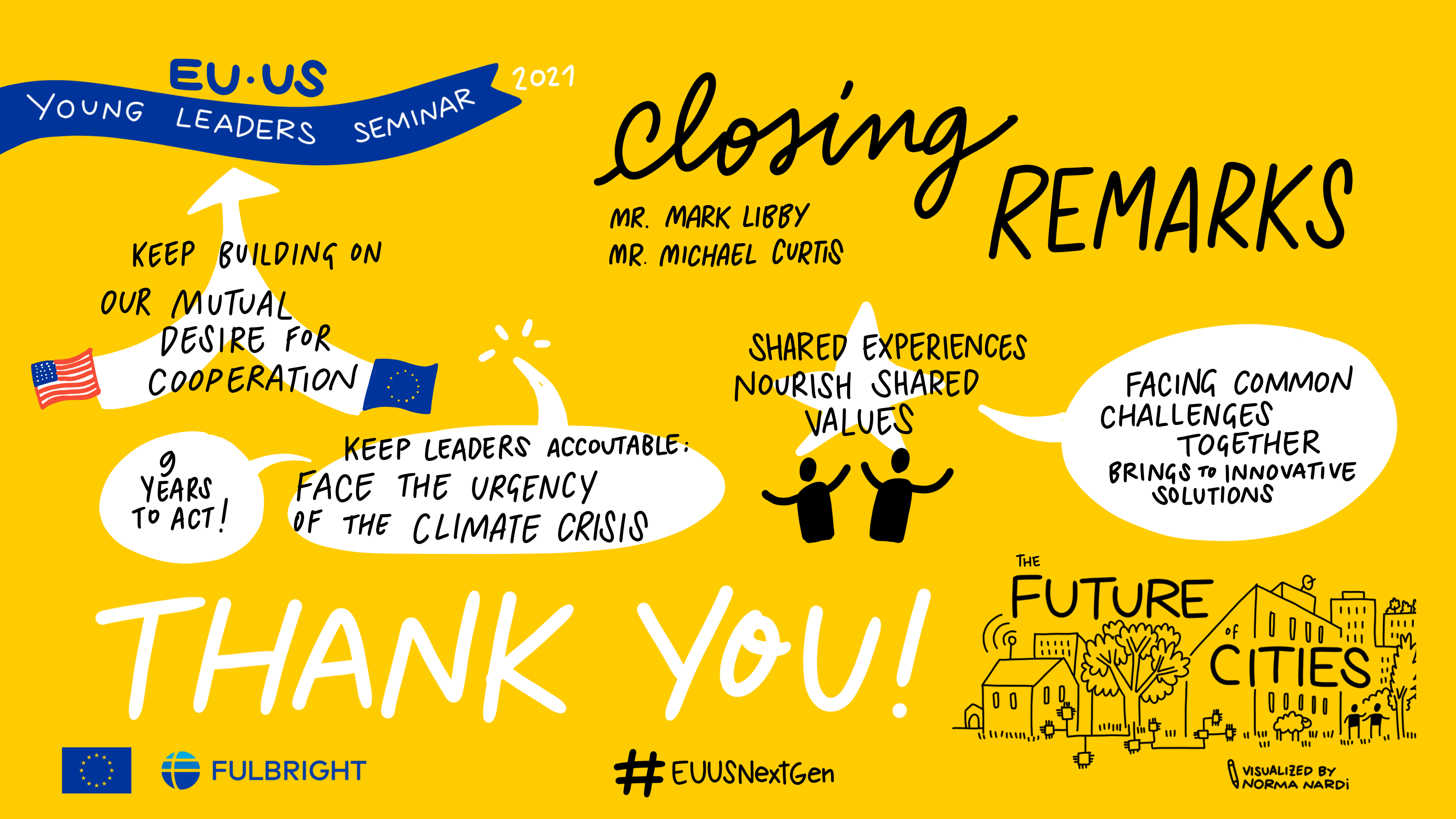From 14 to 20 April 2021, the Fulbright Commission in Brussels facilitated the participation of 20 American alumni of the Fulbright U.S. Student Program and 20 European alumni of EU-funded exchange programs in the 2021 EU-US Young Leaders Seminar on the Future of Cities.
This marked the fourth iteration of the Young Leaders Seminar, which was first held in April 2017. Since its inception, over 200 alumni of U.S. and EU-funded educational exchange programs have participated in the Young Leaders Seminar. Previous iterations of the seminar have focused on topics such as migration, the future of work, and disinformation and media literacy. The decision to focus on the future of cities reflects the importance of this topic to stakeholders on both sides of the Atlantic. Today, cities in the United States and Europe are at the forefront of the social, cultural, environmental, and economic challenges facing future generations. Urban spaces are increasingly seen as laboratories to develop and implement innovations in policy, economic development, environmental resilience, technology, and inclusion.
Seminar highlights
During the Opening Event on Wednesday 14 April 2021, seminar participants based across Europe and the USA were welcomed by event moderator Karen Coleman to the bespoke virtual event platform.
To formally kick off the event, Matt Lussenhop, Acting Assistant Secretary at the U.S. Department of State’s Bureau of Educational and Cultural Affairs, and Themis Christophidou, Director-General of the European Commission’s DG-EAC, delivered opening remarks. In their remarks, A/AAS Lussenhop and Director-General Christophidou highlighted the importance of exchange programs like the Fulbright Program, Erasmus+, and the Marie Skłodowska-Curie Actions to the transatlantic relationship. Reflecting on the importance of young leaders, Director-General Christophidou told participants: “You are an investment we believe in.”
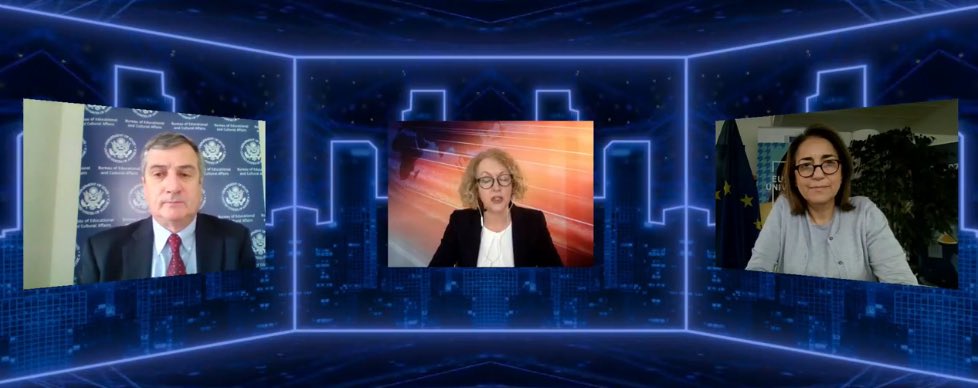
Participants then heard from Fabrizio Barbiero, the Public Manager of the Municipality of Turin, and Colin Tarbert, the President and CEO of the Baltimore Development Corporation. Barbiero and Tarbert spoke to participants about their experience with the EU-funded International Urban Cooperation program, through which they have partnered to incentivize urban innovation, urban regeneration, and equitable economic development. Their work has centered on social innovation, neighborhood regeneration, and adaptive reuse as well as attracting and retaining start-ups in their post-industrial urban centers. Both highlighted the importance of community engagement in achieving successful, sustainable change and the value of international cooperation in tackling shared challenges.
After an inspiring example of transatlantic cooperation, the discussion turned to the future of cities more broadly during a panel discussion with subject matter experts from the United States and Europe. Panelists included Dr. Hannah Abdullah, a research fellow at the CIDOB Global Cities Programme; Dr. Karen Chapple, Professor of Regional Planning and Data Science at UC Berkeley; Dr. Mindy Thompson Fullilove, Professor of Urban Policy and Health at the New School; and Ine Vandecasteele, a scientific officer at the European Commission Joint Research Center.
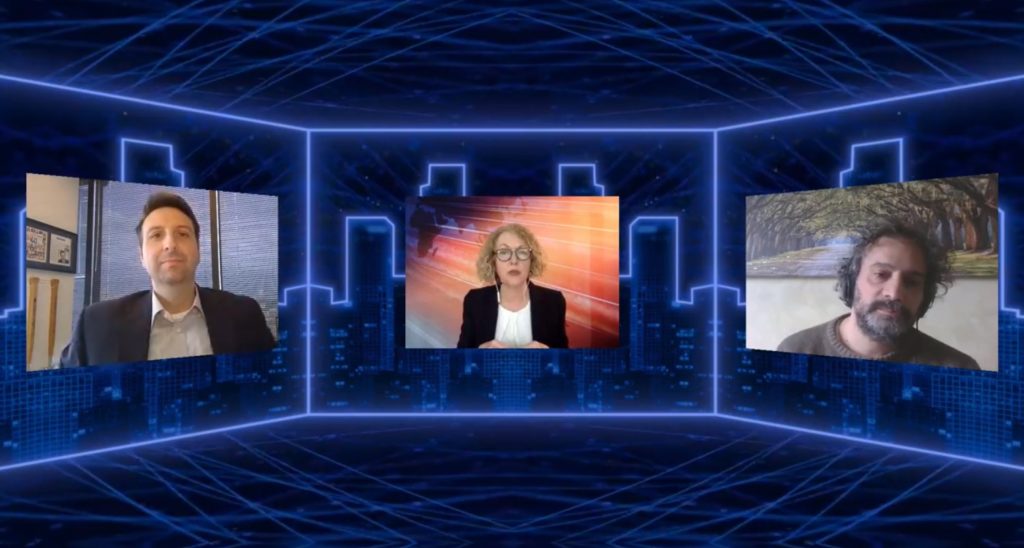
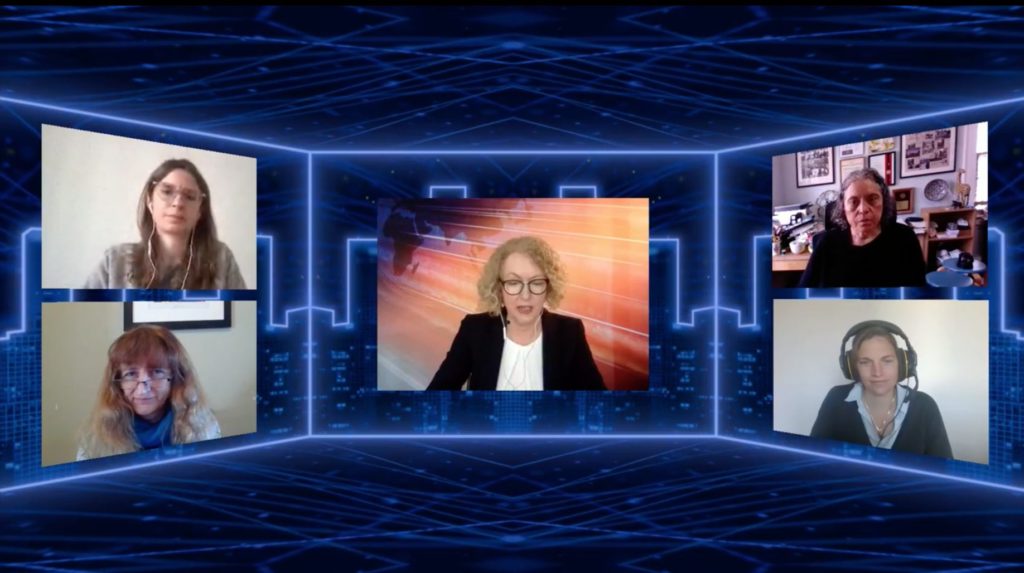
Over the course of the next several days, the forty seminar participants met with subject matter experts from Europe and the United States in their working groups, which discussed the future of cities through the lenses of environment and climate change, technology, diversity and inclusion, and public health.
In addition to working group meetings, participants were able to network via the virtual event platform and even participated in a virtual tea tasting!
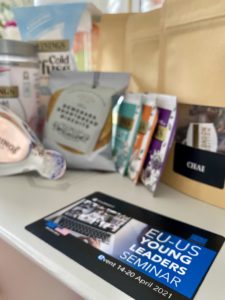
After a week of discussions, the Young Leaders Seminar came to a close on Tuesday 20 April 2021. Back on the virtual platform, participants first heard from Fulbright alumnus Martin Barry, a landscape architect by training who founded the non-profit organization reSITE during his time as a Fulbright Scholar in the Czech Republic. (Although he has now served as the Chairman of reSITE for nearly a decade, Barry laughingly told participants that when he moved to Prague in 2011, “the original intention was NOT to launch a nonprofit that would take over my life. That was just something that happened.”) In a Q&A session moderated by Karen Coleman, Barry responded to participants’ questions about the future of urban development in the United States and in Europe and highlighted inspiring examples of urban innovation on both sides of the Atlantic.
Reflecting on his own Fulbright experience, Barry highlighted the importance of learning to listen and to be humble — skills that have allowed him to build deeper relationships with people from a variety of backgrounds. Still, he encouraged participants to be confident and to experiment: “we can make mistakes, as long as we can learn from them”.
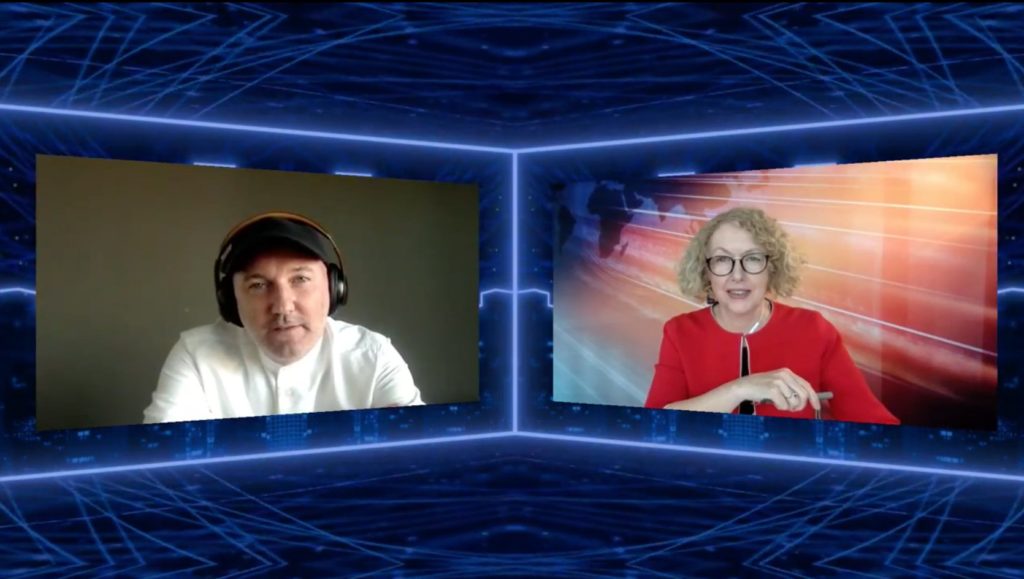
In the final hours of the seminar, seminar participants took the floor to share the outcomes of their working group meetings in a dynamic panel discussion moderated by Karen Coleman.
Sheila B. Lalwani, representing the working group “Technology Transforming Cities”, highlighted the many opportunities that new technologies provide for the development of more sustainable and inclusive urban spaces. The group argued that technology should meet a need and assist city management in connecting residents, spreading information, and further democratizing cities.
As the representative of the “Cities and the Environment” working group, Elsa Anderson then summarized the shared challenges and opportunities identified by her fellow participants. After considering major themes like vulnerability, scale, and mobility, the group argued that cities can be a powerful voice for environmental justice and sustainability. “The environment is personal,” Elsa explained, and cities in the United States and Europe need to respond to the varying needs of all residents.
José Ramon Sabogal Hernandez, representing the working group “Building Inclusive Cities,” began his intervention by defining the sense of “belonging” that all inhabitants deserve to feel. He and his fellow participants produced a series of recommendations, from the economic and political to the social and environmental, designed to encourage inclusive urban spaces.
Finally, Kadri-Ann Kallas, the representative of the “Urban Planning for a Pandemic” working group, presented the outcomes of her group’s interdisciplinary discussion. The group discussed what the COVID-19 pandemic has revealed about life in cities and Kallas identified both shared challenges, like social inequality and a strained health care infrastructure, and opportunities, like an increased push for health, livable cities.
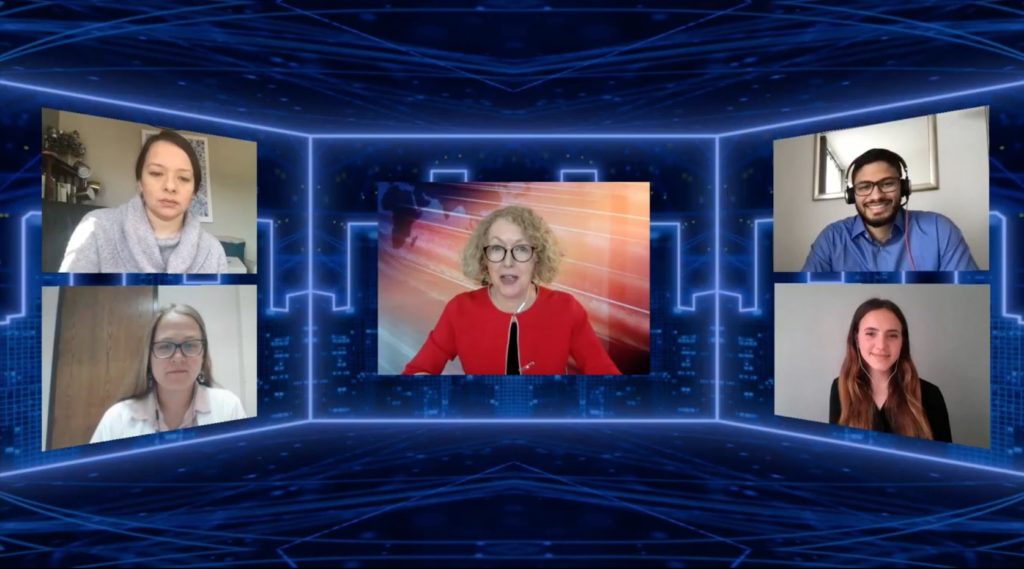
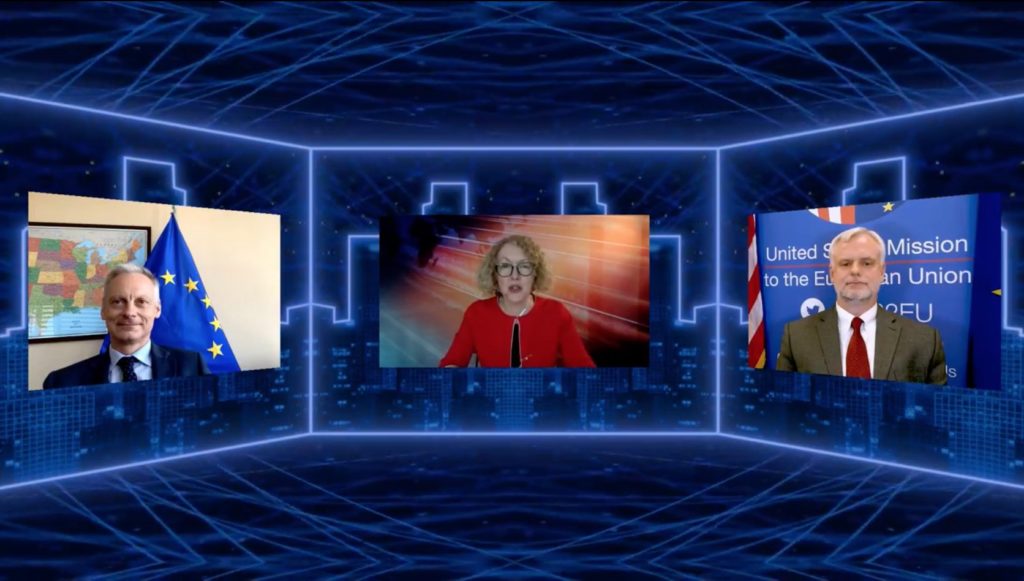
Closing remarks by Michael Curtis, the Deputy Head of Delegation of the European Union to the USA, and Mark Libby, Chargé d’affaires of the U.S. Mission to the European Union, closed out the event.
In their remarks, both Curtis and Libby highlighted the commitment of the United States of America and of the European Union to the transatlantic relationship and underlined the importance of exchange programs and of enrichment events like the EU-US Young Leaders Seminar in promoting a new generation of leadership. According to Chargé d’affaires Libby: “Something exciting happens when we send the best and brightest from both sides of the Atlantic to live in each other’s countries, to study, research and teach in our schools and universities. When you live in another country, you can really begin to understand its culture, people, and perhaps most importantly its values and principles.”
Deputy Head Curtis congratulated the participants on a successful virtual seminar, and thanked them for having come together “in the spirit of cooperation”. He continued: “You have demonstrated that what counts most at these seminars is the presence of ideas, strategies, and vision … not just physical presence.”
The Fulbright Commission would like to thank everyone who made the 2021 EU-US Young Leaders Seminar possible, including but not limited to seminar organizers and staff, external speakers and panelists, and — of course — the motivated, inspiring participants who took time out of their busy schedules to join us in this unique virtual event.
Seminar Schedule
Monday 14 April 2021
16:00 CET | Opening Remarks
Matt Lussenhop, Acting Assistant Secretary, Bureau of Educational and Cultural Affairs
Themis Christophidou, Director General, European Commission DG-EAC
16:15 CET | “From Baltimore to Turin: A Case Study in Transatlantic Urban Cooperation”
Fabrizio Barbiero, Public Manager of the Municipality of Turin
Colin Tarbert, President and CEO of the Baltimore Development Corporation
16:45 CET | “The Future of Cities: Expert Panel Discussion“
Dr. Hannah Abdullah, Research Fellow at the CIDOB Global Cities Programme
Dr. Karen Chapple, Professor of Regional Planning and Data Science at UC Berkeley
Dr. Mindy Thompson Fullilove, Professor of Urban Policy and Health at the New School
Ine Vandecasteele, Scientific Officer at the European Commission Joint Research Center
17:45 CET | Conclusion
Thursday 15 April 2021
(Seminar participants only)
15:00 – 17:00 CET | Technology Transforming Cities: Q&A and Working Group Discussion
Flavio Bono, Engineer at the European Commission Joint Research Center
Can cities really be “smart”? What does a “smart city” actually mean? Technology has transformed the daily lives of citizens, no more so than through connected devices, from smartphones to thermostats. Technology cuts across every sector and decision-makers are demanding more data to help shape their decisions. More advanced sensors, artificial intelligence, and blockchain are changing cities – making them more ‘networked’, more efficient, and more intelligent – in ways both visible and invisible. As hubs of research and innovation, cities are also supporting the development of new technologies and serving as a testing ground for their implementation. What do these technological transformations mean for citizens and how will it serve their needs and interests?
16:30 – 18:30 CET | Cities and the Environment: Q&A and Working Group Discussion
Shannon McDaniel, Director of Data Strategy, Climate and Energy, Global Covenant of Mayors
Cities are on the frontlines of dealing with the environmental challenges of our time, from extreme weather events (hurricanes, fires, droughts, flooding) to the consequences of climate change (e.g. sea-level rise). These developments have massive human and economic impacts, and emissions / pollution from urban areas are often driving these changes. Cities are also, in many cases leading the charge when it comes to finding solutions to build a cleaner, more resilient, carbon-neutral environment for the well-being of citizens. From so-called ‘passive’ building standards to cleaner public mobility options and banning some single-use plastics, cities are developing and implementing some of the most innovative strategies and policies in the field of climate and the environment. Networks of cities have sprouted across the world to exchange best practices, knowledge, and experience to take this agenda forward.
Friday 16 April 2021
(Seminar participants only)
15:00 – 17:00 CET | Building Inclusive Cities: Expert Q&A and Discussion
Dr. Edward Goetz, Professor of Urban and Regional Planning at University of Minnesota
Giulia Maci, Urban Specialist, Cities for Women Programme at Cities Alliance
Cities by their very definition have a higher concentration of people than more suburban or rural areas and have, for centuries, attracted residents from far and near. In cities, people of different backgrounds, cultures, socio-economic status, and languages have to all live, work, and exist together in a single morass, but not always easily or comfortably. Cities on both sides of the Atlantic face challenges in ensuring that all their citizens feel they are included in the community’s social fabric and can benefit from economic growth. Cities’ attraction for migrants looking for safety, security, or economic opportunity has also been a significant factor in driving socio-cultural developments in urban areas. Questions of inclusion or belonging extend beyond socio-economic status and ethnic or cultural background to gender, sexual orientation, disability, age, and many other factors. What should cities do to be more inclusive and create a sense of belonging and opportunity for all their citizens?
16:30 – 18:30 CET | Urban Planning for a Pandemic: Expert Q&A and Discussion
Henrique Andre Morgado Simoes, EP Climate Action Research and Tracking Service
It is difficult to overstate the impact of the COVID-19 pandemic on urban life in the European Union and the United States over the past year. The pandemic, which spread like wildfire through densely-populated urban areas, has highlighted existing inequalities and public health challenges. What lessons have public health professionals learned from the pandemic, and what changes will continue to impact our urban spaces for years to come?
Tuesday 20 April 2021
16:00 CET | Welcome
16:10 CET | “Designing the Lovable City”
Martin Barry, reSITE
16:45 CET | The Future of Cities: Presentation of Working Group Recommendations
18:15 CET | Closing Remarks
Michael Curtis, Deputy Head of Delegation of the European Union to the USA
Mark Libby, Chargé d’affaires of the U.S. Mission to the European Union
Seminar outputs
